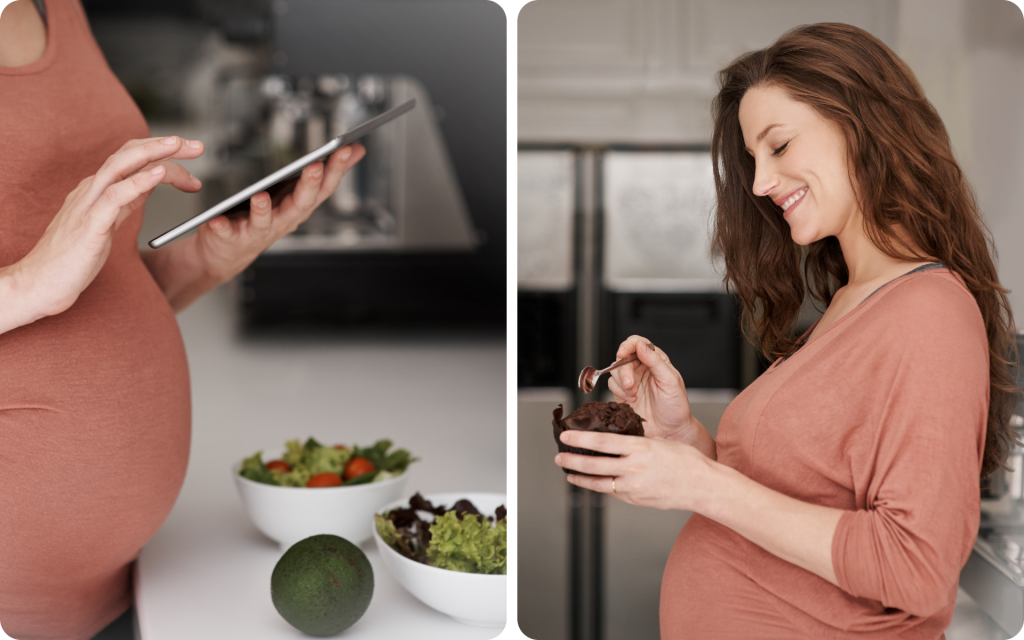Every soon-to-be mother wonders about the best foods to eat during pregnancy. You may be wondering whether you need to change your diet completely and what to do if you’re craving a slice of pizza.
The truth is that you don’t need to go on a special diet when you’re pregnant. You can indulge in the occasional treat, including pizza and other foods you love. However, moderation is the key. Maintaining a healthy diet that includes all the nutrients you and your growing baby need is also important.
Here’s what you need to know about the best pregnancy diet menu.
What Is the Best Diet for a Pregnant Woman?
According to the NHS, the Office of Disease Prevention and Health Promotion, and UNICEF, the best diet for a pregnant woman is one that’s rich in (1, 2, 3)
- A variety of whole fruits and vegetables.
- Whole grains such as oats, barley, quinoa, brown rice, and bulgur.
- Proteins from lean animal meats, in addition to plant proteins.
- Low-fat or fat-free pasteurized dairy products. Dairy alternatives are also allowed, but look for fortified variations.
- Healthy oils and fats.
Such a healthy and balanced diet helps provide nourishment for you and your growing baby.
How Many Calories Should a Pregnant Woman Eat?
A common myth is that pregnant women “eat for two”. This is not only untrue, it could also lead to unhealthy maternal weight gain, which may negatively affect the mother and baby (4). While an expectant mother does need to eat more calories than she was consuming on her pre-pregnancy diet, she doesn’t need to double her calorie intake
The truth is that pregnant women only need to consume an additional 340 to 450 calories each day during their second and third trimesters (2, 5). Note that women carrying twins or triplets are recommended to consume approximately 600 and 900 extra calories a day, respectively (5).
Once you’ve delivered your baby and are actively breastfeeding, your body will need an extra 450 to 500 calories to make enough milk for your infant (6).
Please Note:
If you’re worried about gaining weight while pregnant as you need to consume more calories, remember that gaining weight while expecting is a normal part of the process. The amount of healthy weight gain in pregnant women is largely dependent on pre-pregnancy weight.
Speak to your health provider to better understand how much healthy weight you’re expected to gain – this can help you keep track of the chances of unhealthy gestational weight gain (7).
Check out this article to learn more about an early pregnancy workout: safety tips and more.
What Are the Best Foods to Eat While Pregnant?
The best pregnancy diet plan menu consists of a variety of whole, healthy foods, such as:
- Fruits And Vegetables
It’s important to try and eat five servings of fruits and vegetables every day when pregnant, including fresh, frozen, or canned produce and 100% fruit juices. These foods are rich in vitamins and minerals, such as A, E, K, and C, fiber, folate, potassium, magnesium, iron, phosphorus, zinc, and calcium.
These foods are also rich in antioxidants that protect cells from damage and may help prevent conditions such as gestational diabetes and other pregnancy disorders, in addition to adverse birth disorders (8, 9).
- Complex Carbohydrates
Any healthy 7-day meal plan for pregnant women needs to include complex carbohydrates. These foods provide your body with energy so you don’t feel tired and lethargic (10).
A pregnant woman’s carbohydrate intake recommendation varies by region and country. In the United States, pregnant women are recommended to consume at least 175 grams of carbohydrate per day, which is 45 g more than non-pregnant women (11).
Whole grains such as oatmeal or quinoa, brown rice, and whole-wheat bread and pasta, together with legumes such as lentils and beans are rich in vitamins, such as E, B1, B2, B3, and B6, iron, folate, magnesium, potassium, fiber, and protein.
If you wish to free yourself from all the extra pounds that have been weighing you down for way too long, start using the BetterMe: Health Coaching app and overhaul your entire life!
- Proteins
Plant-based and lean animal proteins are also another essential part of a healthy pregnancy diet menu week-by-week plan. According to research, adequate intake of proteins is good for the mother and essential for fetal growth, survival, birth weight, and more (12).
The recommended dietary allowance (RDA) for protein during the first trimester of pregnancy is estimated at 46 g a day and 71 g per day during the second and third trimesters (13).
Excellent sources for a 7-day pregnancy diet menu include lean meats, poultry, fish, eggs, dairy, beans, lentils, nuts, seeds, and soy products.
- Healthy Fats
Expectant mothers should consume up to 30% of their daily calorie intake from healthy fats and oils (14). Healthy fat sources olive oil, avocado, nut butter, oily fish, grass-fed butter, and full-fat dairy products, are all great options. Healthy fats with omega-3 fatty acids are particularly important for your baby’s brain development after birth (5).
- Dairy and Dairy Alternatives
Research on the consumption of milk and other dairy products during pregnancy has shown a decreased risk of adverse maternal outcomes and increased benefits in infant birth weight and length (15, 16). Dairy products and fortified dairy products are also rich in calcium, which is essential for the bone health of the expectant mother and baby.
Supplementation During Pregnancy
It’s also a good idea to take supplements throughout pregnancy to make up for any nutritional deficiencies. Make sure to talk with your doctor or a registered dietitian before you start taking supplements, as some may be harmful during pregnancy. Generally, pregnant women need to supplement the following nutrients, so look for a prenatal vitamin formulated for pregnancy that contains them.
Iron
Iron is a major component of hemoglobin. Hemoglobin is the protein that carries oxygen in red blood cells. The maternal volume of blood in the body rises by roughly 45% during pregnancy (17). To generate extra hemoglobin in this blood, pregnant women need more iron. An iron deficiency in pregnancy has been shown to lead to adverse pregnancy outcomes, including increased maternal illness, low birth weight, prematurity, slow and smaller-than-average fetal growth, and problems with fetal brain development (18).
Taking a prenatal supplement with iron ensures that you have sufficient iron throughout your pregnancy.
Folate
Pregnant women need 600 micrograms of folate daily. Folate is needed for healthy cell division, particularly during fetal growth and pregnancy. It’s also important for the formation of red blood cells (19). As it’s essential during the very early stages of pregnancy, it’s often recommended that folate (or folic acid) supplementation is started a few months before conception.
Vitamin D
Adequate vitamin D intake during pregnancy may lower your risk of preeclampsia, gestational diabetes, bacterial vaginosis, and preterm labor. Vitamin D plays a crucial role in helping your body absorb calcium and phosphorus (20).
During pregnancy, it’s important to get at least 600 IU of vitamin D every day as you’re more likely to be deficient in vitamin D when pregnant.
Zinc
A pregnant woman needs 11 milligrams of zinc daily (21). Some studies have shown that supplementing with zinc may improve birth outcomes and reduce the risk of preterm births, particularly for low-income women (22).
Choline
The majority of pregnant women don’t get enough choline in their diet. Choline helps with the development and growth of the nervous system and liver during fetal life and infancy. Research has suggested that choline influences early brain development, learning abilities, memory retention, and behavior in infants (28).
Sample Healthy Pregnancy Diet Menu
Here’s an example of a 7-day healthy menu for pregnant women:
Day One
- Breakfast: Oatmeal with berries and milk
- Snack: 1 banana and ½ cup yogurt
- Lunch: Mixed greens, chopped walnuts, crumbled feta cheese, 1 tablespoon balsamic vinaigrette on top of a bed of mixed fruit
- Snack: Whole-wheat crackers with sliced cucumbers and tomato slices spread with hummus
- Dinner: Wild salmon with a side salad of spinach, carrots, and tomatoes drizzled with olive oil, or your favorite light dressing, and fresh fruit for dessert
Day Two
- Breakfast: Avocado, eggs, and whole-grain toast
- Snack: Carrot sticks and cucumber slices dipped in hummus
- Lunch: Vegetable stir fry (broccoli, carrots, red peppers, mushrooms) over steamed brown rice
- Snack: 1 apple and one ounce of almonds
- Dinner: Chicken fajitas (chicken breast pieces sautéed with green pepper strips and onion slices on a whole-wheat tortilla), and a side of fresh fruit for dessert
Day Three
- Breakfast: Omelet made with spinach, tomato, and avocado, served with 1 slice of whole-grain toast or a corn/bean tortilla
- Snack: 1 medium banana and 1 ounce of peanuts
- Lunch: Vegan Mexican bean salad consisting of black beans, corn, salsa, and avocado on a bed of lettuce
- Snack: One pear and a one-ounce serving of almonds
- Dinner: Chef Salad (chopped romaine with tomato wedges, cucumber slices, croutons, and hard-boiled egg chunks), and a side dish of fresh fruit for dessert
The BetterMe: Health Coaching app will provide you with a host of fat-frying fitness routines that’ll scare the extra pounds away and turn your body into a masterpiece! Get your life moving in the right direction with BetterMe!
Day Four
- Breakfast: Creamy quinoa cereal made by cooking quinoa with skim milk, cinnamon, and blueberries
- Snack: A small handful of almonds and 1 medium apple
- Lunch: Whole-wheat spaghetti with turkey meatballs, sautéed zucchini, kale, and tomato sauce
- Snack: A small bowl of sugar snap peas and a piece of string cheese
- Dinner: Roasted chicken breast over steamed brown rice topped with sautéed mushrooms and onions
Day Five
- Breakfast: Overnight oats topped with berries, nuts, and chia seeds
- Snack: A medium banana and 1-ounce peanuts.
- Lunch: Steamed broccoli with whole-grain pasta, grated parmesan cheese, olive oil, salt, and pepper
- Snack: A medium orange
- Dinner: Lamb chops with green beans, sautéed mushrooms, and onions; fresh fruit for dessert
Day Six
- Breakfast: Overnight oats topped with berries, nuts, and chia seeds
- Snack: Greek yogurt topped with chia seeds
- Lunch: Vegan Mexican bean salad consisting of black beans, corn salsa, avocado on a bed of lettuce
- Snack: 1 apple and a handful of almonds
- Dinner: Slow-cooker beef chili
Day Seven
- Breakfast: Quinoa cereal made by cooking quinoa with skim milk, cinnamon, and blueberries
- Snack: A small handful of almonds and a medium banana
- Lunch: Steamed broccoli with whole-grain pasta, grated parmesan cheese, olive oil, salt, and pepper
- Snack: 1 medium orange
- Dinner: Baked tilapia fillets over sautéed spinach and mushrooms with mashed potatoes, and fresh fruit for dessert
For a more in-depth meal plan, check out our article on a 28-week pregnancy diet.
Which Foods Should Pregnant Women Avoid?
Avoiding foodborne illness is particularly important during pregnancy. You should exercise caution when including these foods in your pregnancy diet plan menu:
Raw or Undercooked Meat, Poultry, Eggs, and Seafood
These foods may contain bacteria called listeria, which can cause illness in a mother and baby during pregnancy. These foods also include processed meats such as deli meats (24). If you do eat these foods, make sure they’re cooked thoroughly, with no pink left in the center of the meat before eating them.
Pre-prepared Foods, Ready Meals, or Takeaways
Pre-prepared foods are usually made with raw eggs, meats, poultry, etc. They may not have been cooked at high enough temperatures to kill the harmful bacteria that is found in these ingredients, so they may cause illness when you eat them.
Unpasteurized Juice or Dairy Products
Unpasteurized juice, raw milk, or unpasteurized cheese can contain the bacteria listeria (24). Pasteurization kills the bacteria before these products reach your table.
Unwashed Vegetables and Fruit
Produce, such as fruits, vegetables, and salads, should be washed thoroughly before eating to remove any harmful bacteria.
Read more: Pregnancy Treadmill Workout: Benefits, Safety, and a Sample Routine
What Is a Good Pregnancy Diet Menu to Lose Weight?
While it’s commendable that you’re considering achieving a healthy weight before meeting your baby, weight loss may not be the best idea at this time. Weight loss requires reducing your calorie intake and performing exercise, sometimes high-impact workouts, to see quick and long-term results.
During pregnancy, high-impact workouts aren’t recommended, and cutting your calorie intake may have adverse effects on you and your baby. However, all hope is not lost. Healthy weight loss during pregnancy may be achieved with the right conditions and guidance.
You should speak to your health provider so you can come up with a dietary and low-impact exercise plan that will help you shed those extra calories without risking your health and pregnancy.
Most answers to what makes a baby beautiful in the womb are anecdotal and have no scientific research to back them. Your baby’s features are based on parental genetics. Yes, coconut water is a good and safe option for hydration during pregnancy (25). There isn’t one single “best” fruit for pregnancy. All fruits are good for pregnancy, so eat as many as you can and in as many varieties as you can find. Research has shown that low physical activity and poor nutrition can impair brain development in the womb. To avoid this, pregnant women should increase their physical activity – within the recommended safety precautions – and they should also maintain a healthy diet. Low-mercury seafood and iron and folate-rich foods may help improve cognitive development in the womb and may also reduce the risk of the development of cognitive and brain-related adverse effects (26, 27).Frequently Asked Questions
What makes a baby beautiful in the womb?
Is coconut water good for pregnancy?
Which fruit is best for pregnancy?
How can I improve my baby’s brain during pregnancy?
The Bottom Line
When you’re considering specifications for your pregnancy diet menu, you should aim to eat a healthy and well-balanced diet that’s full of whole grains, plant-based proteins, healthy fats, and fresh produce.
It’s okay to indulge in occasional treats as long as they come from nutrient-dense foods that provide the vitamins and minerals that are needed for the health of both mother and baby.
Consult a healthcare professional or registered dietitian to get more personalized advice regarding your nutrition regimen during pregnancy – after all, every woman is different.
DISCLAIMER:
This article is intended for general informational purposes only and does not serve to address individual circumstances. It is not a substitute for professional advice or help and should not be relied on for making any kind of decision-making. Any action taken as a direct or indirect result of the information in this article is entirely at your own risk and is your sole responsibility.
BetterMe, its content staff, and its medical advisors accept no responsibility for inaccuracies, errors, misstatements, inconsistencies, or omissions and specifically disclaim any liability, loss or risk, personal, professional or otherwise, which may be incurred as a consequence, directly or indirectly, of the use and/or application of any content.
You should always seek the advice of your physician or other qualified health provider with any questions you may have regarding a medical condition or your specific situation. Never disregard professional medical advice or delay seeking it because of BetterMe content. If you suspect or think you may have a medical emergency, call your doctor.
SOURCES:
- Have a healthy diet in pregnancy (2023, nhs.uk)
- Eat Healthy During Pregnancy: Quick Tips (2025, odphp.health.gov)
- What to eat when pregnant: Tips for nourishing your growing baby. (n.d., unicef.org)
- Magnitude and Factors Associated with Gestational Weight Gain Adequacy among Pregnant Women in South Gondar Zone, Northwest Ethiopia (2023, sciencedirect.com)
- Nutrition During Pregnancy (2023, acog.org)
- Breastfeeding Your Baby (2023, acog.org)
- Pregnancy: Learn More – Weight gain in pregnancy (2021, ncbi.nlm.nih.gov)
- A Daily Snack Containing Leafy Green Vegetables, Fruit, and Milk before and during Pregnancy Prevents Gestational Diabetes in a Randomized, Controlled Trial in Mumbai, India (2016, sciencedirect.com)
- Fruits and vegetables intake improves birth outcomes of women with gestational diabetes mellitus and hypertensive disorders of pregnancy (2024, bmcnutr.biomedcentral.com)
- Types of Carbohydrates Intake during Pregnancy and Frequency of a Small for Gestational Age Newborn: A Case-Control Study (2019, pmc.ncbi.nlm.nih.gov)
- Maternal Dietary Carbohydrate and Pregnancy Outcomes: Quality over Quantity (2024, pmc.ncbi.nlm.nih.gov)
- Impacts of maternal dietary protein intake on fetal survival, growth, and development (2018, pmc.ncbi.nlm.nih.gov)
- Adequacy and Sources of Protein Intake among Pregnant Women in the United States, NHANES 2003–2012 (2021, pmc.ncbi.nlm.nih.gov)
- Current Guidelines on Fat Intake in Pregnant and Lactating Women, Infants, Children, and Adolescents: A Scoping Review (2023, karger.com)
- Effects of Milk and Dairy Product Consumption on Pregnancy and Lactation Outcomes: A Systematic Review (2019, pmc.ncbi.nlm.nih.gov)
- A review of dairy food intake for improving health for black women in the US during pregnancy, fetal development, and lactation (2024, pubmed.ncbi.nlm.nih.gov)
- Physiological changes in pregnancy (2016, pmc.ncbi.nlm.nih.gov)
- Iron Deficiency in Pregnancy (2021, pmc.ncbi.nlm.nih.gov)
- Folic Acid Supplementation and Pregnancy: More Than Just Neural Tube Defect Prevention (2011, pmc.ncbi.nlm.nih.gov)
- Vitamin D supplementation during pregnancy: an overview (2020, pubmed.ncbi.nlm.nih.gov)
- Nutrition Recommendations in Pregnancy and Lactation (2017, pmc.ncbi.nlm.nih.gov)
- Zinc supplementation for improving pregnancy and infant outcome (2015, pmc.ncbi.nlm.nih.gov)
- Choline: Critical Role During Fetal Development and Dietary Requirements in Adults (2008, pmc.ncbi.nlm.nih.gov)
- Listeria and Pregnancy (2022, acog.org)
- Is coconut water truly a miracle drink in pregnancy or a myth? (2024, pmc.ncbi.nlm.nih.gov)
- Physical activity during pregnancy and baby brain development – The elephant in the consulting room (2024, sciencedirect.com)
- Maternal Nutrition during Pregnancy and Offspring Brain Development: Insights from Neuroimaging (2024, pmc.ncbi.nlm.nih.gov)













